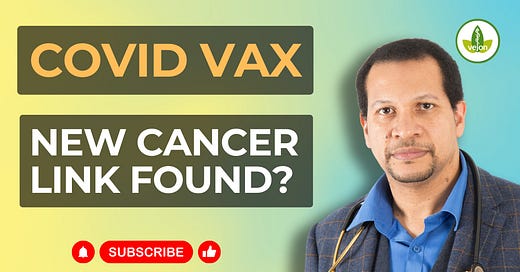Recent research suggests another potential link between COVID-19 vaccinations and cancer, based on a small study and other supporting research.
I came across a study examining the upregulation of Programmed cell death ligand-1 (PD-L1), a protein that can suppress the immune system and is often exploited by cancer cells to evade immune detection. This study observed increased PD-L1 levels in patients who had received COVID-19 booster shots, which raised concerns about the implications for cancer risk.
Two recently-vaccinated patients, in remission of NSCLC and receiving non-immunosuppressive cancer therapies (immunotherapy and tyrosine kinase inhibitor respectively), showed increasing PD-L1 tracer uptake in ipsilateral axillary lymph nodes.
MacManus, Michael P., et al. "Response to COVID-19 vaccination imaged by PD-L1 PET scanning." EJNMMI reports 8.1 (2024): 16.
The study found that two out of five patients who received booster doses showed increased PD-L1 tracer uptake on the same side of the body where the vaccine was injected. This phenomenon was absent in a patient on immunosuppressive therapy, highlighting the importance of the immune system's state in these observations.
It's important to note that both the vaccine and SARS-CoV-2 infection itself can cause PD-L1 upregulation. This dual source of immune modulation underscores the need for thorough, long-term studies to fully understand the implications.
Interestingly, we observed higher PD‐L1 expression in Omicron‐infected cells than SARS‐CoV‐2 infected cells. Blocking PD‐L1 at an early stage of virally‐infected AAV‐hACE2 mice significantly recovered lymphocyte counts and lowered inflammatory cytokine levels.
Huang, Hsiang‐Chi, et al. "Upregulation of PD‐L1 by SARS‐CoV‐2 promotes immune evasion." Journal of Medical Virology 95.2 (2023): e28478.
Clinically, I have noticed an alarming trend of patients presenting with advanced stages of cancer, making treatment more challenging. This shift from early to late-stage diagnosis could be partly due to disruptions in healthcare services during the pandemic, but we cannot ignore the potential role of immune modulation from vaccines or infections.
Cancer development involves multiple failures in the body's defenses, with the immune system serving as the last line of protection. Anything that compromises immune function, including PD-L1 upregulation, could theoretically increase cancer risk. It's crucial to understand that cancer is not an immediate occurrence but a process requiring multiple factors to align.
Discounted Course Available here with Coupon >
I advocate for more extensive research to understand these patterns and their implications. While the connection between COVID-19 vaccines and cancer remains an area of active investigation, my insights highlight the importance of ongoing research and vigilance in understanding the long-term effects of vaccination and infection on the immune system and cancer risk.
Please support my research efforts by subscribing to Vejon Health Substack. Your support allows me to continue bringing you my insights in a timely and effective way.















Share this post